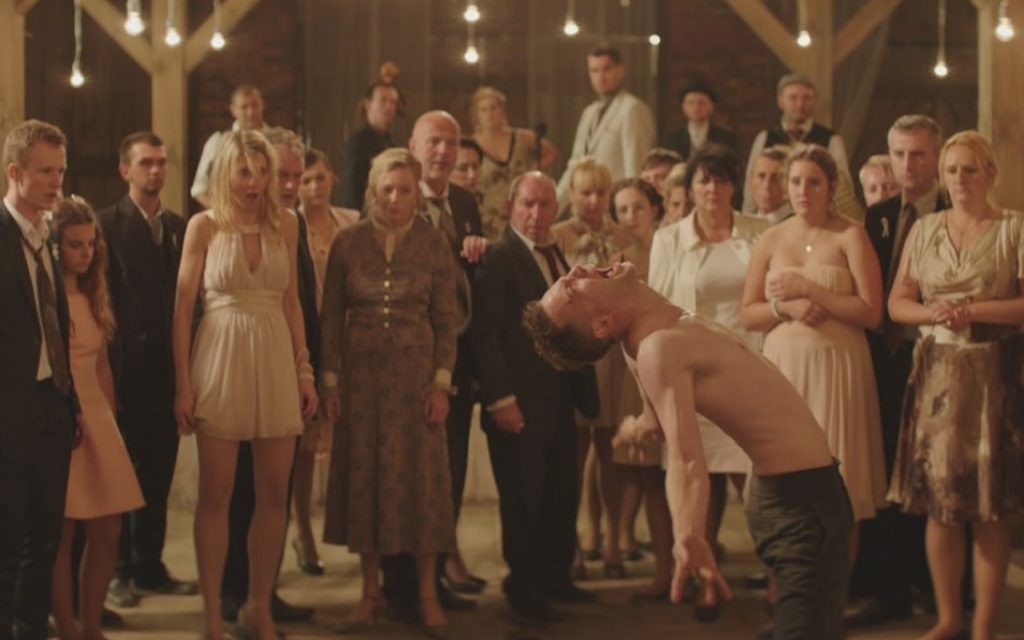Films Help Poland Confront Troubled Past
The recently completed 16th Atlanta Jewish Film Festival provided three distinct views of Poland and its Jewish history.
The murder mystery “A Grain of Truth,” the spooky dybbuk-driven drama “Demon” and the short documentary “800 Jews From Our Town” confront a history of anti-Semitism and its legacy in different ways, but each in the end makes a case for openness about the past.
“Polish cinema since World War II has been amazing. … These films are also fascinating,” Emory University film professor Matthew Bernstein said.
Get The AJT Newsletter by email and never miss our top stories Free Sign Up
“There have been a series of films recently dealing with the more difficult history of Poles and Jews,” said Rachel Rothstein, who teaches modern Jewish history at the Weber School, has visited Poland half a dozen times since her own senior year at Weber, and lived in Poland in 2011 and 2012 while researching her dissertation on Jews in Poland and the United States.
Those recent Polish films include “In Darkness,” nominated for a 2012 Oscar, and “Ida,” which last year became the first Polish movie to win a foreign-language Oscar.
“Poland has been putting out a fair number every year for the last little while of films that deal with Jewish content and are extremely high quality,” festival chair Max Leventhal said.
“I think that for the most part the conversations these films have initiated have been very positive,” Rothstein said.
The documentary “800 Jews From Our Town” is all about such conversations. The half-hour film, which made its world premiere at the Atlanta festival, follows high school students in the southeastern town of Bircza as they seek the truth about the fate of the Jews who lived there until World War II.
The students work with School of Dialogue, a government-chartered educational program that focuses on Polish-Jewish dialogue and deals with the past to strengthen the future. Rothstein said: “It’s one of many organizations that’s really trying to bring together Jews and Poles or at least expose Polish students to Polish-Jewish history. The things I’ve seen are very interesting.”
Rabbi Haim Dov Beliak, who leads Friends of Jewish Renewal in Poland, said School of Dialogue is good at providing information to Polish students, and the organization’s success comes through in the film. The students, who don’t know any Jews, overcome their initial stereotypes and misconceptions as they not only uncover the truth, but also work to establish a monument to the slain Jews.
“The people bringing this history back are the youngest members of the community,” director Filip Luft said. “They are entering adulthood by learning about Jews and telling that story to others. … It’s something that happens in Poland. It is between these two realities, between something totally forgotten and history we have to deal with and want to bring it back.”
Buried history forces itself into the present in the two feature-length fictional films that played at the festival.
In “A Grain of Truth,” ritual murders are staged to echo the blood libel in a provincial Polish city so obsessed with that anti-Semitic lie that the cathedral features a mural of the libel. In the course of the investigation, the secret Jewish past of one resident is revealed, raising the question of whether that person is a killer or a scapegoat.
Rabbi Beliak said the movie was entertaining and instructive. “Usually, one does not want to burden an entertainment medium with too much ideological trappings,” he said, adding that the film is loaded down with coded material viewers might miss on first viewing. “I think the discussion will demand some sophistication in the genres of not only folk rumors and history, but also detective novels.”
“Demon” is the least straightforward of the three. It’s a story of possession with some of the shock value of “The Exorcist” and the depth and spookiness of “The Shining.” The possession leads to the revelation that the farm where the action takes place came into the possession of a well-off Polish family because the Jewish owners were killed by the Nazis.
Anti-Semitism does not come into play; instead, the underlying theme is the lingering guilt over the advantages some Poles gained from the slaughter of millions of Jews.
Polish filmmakers are telling such difficult, painful stories while society at large is finally talking about the history, including many popular books, Luft said.
“It’s something still in our minds as kind of an open wound — that we had a big Jewish community before the war, and now there is nothing,” he said. “We kind of perceive this absence.”
But Rothstein said Poland has an unfair reputation for anti-Semitism. She said the way the Jewish community feels safe without visible security is a sign of the reality of Jewish comfort in Poland.
“It’s such a difficult history,” she said. “You have to try to look at it from the Polish perspective as well as the Jewish perspective.”
Luft said Poles get frustrated when their country is viewed as the scene of the Holocaust, which wasn’t their creation. But he also said his countrymen can’t be afraid to acknowledge the difficult parts of their past.
“We want to talk about it now much more than we used to,” Luft said.
Rothstein said the remarkable thing about Poland today is how the past three generations have lived through such different times under such different governments, and college students today are able to look at what they’re learning compared with what their parents learned under the Communists and what their grandparents experienced under the Nazis.
“It’s pretty phenomenal,” she said. “It’s a country with a lot of healing to do and learning to do.”






comments